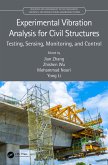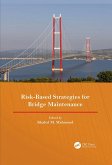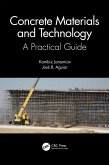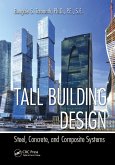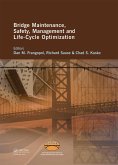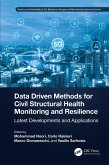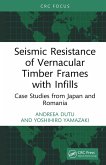Experimental Vibration Analysis for Civil Structures (eBook, ePUB)
Testing, Sensing, Monitoring, and Control
Redaktion: Zhang, Jian; Li, Yong; Noori, Mohammad; Wu, Zhishen
48,95 €
48,95 €
inkl. MwSt.
Sofort per Download lieferbar

24 °P sammeln
48,95 €
Als Download kaufen

48,95 €
inkl. MwSt.
Sofort per Download lieferbar

24 °P sammeln
Jetzt verschenken
Alle Infos zum eBook verschenken
48,95 €
inkl. MwSt.
Sofort per Download lieferbar
Alle Infos zum eBook verschenken

24 °P sammeln
Experimental Vibration Analysis for Civil Structures (eBook, ePUB)
Testing, Sensing, Monitoring, and Control
Redaktion: Zhang, Jian; Li, Yong; Noori, Mohammad; Wu, Zhishen
- Format: ePub
- Merkliste
- Auf die Merkliste
- Bewerten Bewerten
- Teilen
- Produkt teilen
- Produkterinnerung
- Produkterinnerung

Bitte loggen Sie sich zunächst in Ihr Kundenkonto ein oder registrieren Sie sich bei
bücher.de, um das eBook-Abo tolino select nutzen zu können.
Hier können Sie sich einloggen
Hier können Sie sich einloggen
Sie sind bereits eingeloggt. Klicken Sie auf 2. tolino select Abo, um fortzufahren.

Bitte loggen Sie sich zunächst in Ihr Kundenkonto ein oder registrieren Sie sich bei bücher.de, um das eBook-Abo tolino select nutzen zu können.
Experimental Vibration Analysis for Civil Structures: Testing, Sensing, Monitoring, and Control covers a wide range of topics in the areas of vibration testing, instrumentation, and analysis of civil engineering and critical infrastructure.
- Geräte: eReader
- mit Kopierschutz
- eBook Hilfe
Andere Kunden interessierten sich auch für
![Experimental Vibration Analysis for Civil Structures (eBook, PDF) Experimental Vibration Analysis for Civil Structures (eBook, PDF)]() Experimental Vibration Analysis for Civil Structures (eBook, PDF)48,95 €
Experimental Vibration Analysis for Civil Structures (eBook, PDF)48,95 €![Risk-Based Strategies for Bridge Maintenance (eBook, ePUB) Risk-Based Strategies for Bridge Maintenance (eBook, ePUB)]() Risk-Based Strategies for Bridge Maintenance (eBook, ePUB)52,95 €
Risk-Based Strategies for Bridge Maintenance (eBook, ePUB)52,95 €![Concrete Materials and Technology (eBook, ePUB) Concrete Materials and Technology (eBook, ePUB)]() Kambiz JanamianConcrete Materials and Technology (eBook, ePUB)121,95 €
Kambiz JanamianConcrete Materials and Technology (eBook, ePUB)121,95 €![Tall Building Design (eBook, ePUB) Tall Building Design (eBook, ePUB)]() Bungale S. TaranathTall Building Design (eBook, ePUB)194,95 €
Bungale S. TaranathTall Building Design (eBook, ePUB)194,95 €![Bridge Maintenance, Safety, Management and Life-Cycle Optimization (eBook, ePUB) Bridge Maintenance, Safety, Management and Life-Cycle Optimization (eBook, ePUB)]() Bridge Maintenance, Safety, Management and Life-Cycle Optimization (eBook, ePUB)54,95 €
Bridge Maintenance, Safety, Management and Life-Cycle Optimization (eBook, ePUB)54,95 €![Data Driven Methods for Civil Structural Health Monitoring and Resilience (eBook, ePUB) Data Driven Methods for Civil Structural Health Monitoring and Resilience (eBook, ePUB)]() Data Driven Methods for Civil Structural Health Monitoring and Resilience (eBook, ePUB)105,95 €
Data Driven Methods for Civil Structural Health Monitoring and Resilience (eBook, ePUB)105,95 €![Seismic Resistance of Vernacular Timber Frames with Infills (eBook, ePUB) Seismic Resistance of Vernacular Timber Frames with Infills (eBook, ePUB)]() Andreea DutuSeismic Resistance of Vernacular Timber Frames with Infills (eBook, ePUB)21,95 €
Andreea DutuSeismic Resistance of Vernacular Timber Frames with Infills (eBook, ePUB)21,95 €-
-
-
Experimental Vibration Analysis for Civil Structures: Testing, Sensing, Monitoring, and Control covers a wide range of topics in the areas of vibration testing, instrumentation, and analysis of civil engineering and critical infrastructure.
Dieser Download kann aus rechtlichen Gründen nur mit Rechnungsadresse in A, B, BG, CY, CZ, D, DK, EW, E, FIN, F, GR, HR, H, IRL, I, LT, L, LR, M, NL, PL, P, R, S, SLO, SK ausgeliefert werden.
Produktdetails
- Produktdetails
- Verlag: Taylor & Francis eBooks
- Seitenzahl: 610
- Erscheinungstermin: 4. November 2020
- Englisch
- ISBN-13: 9781000178692
- Artikelnr.: 60146412
- Verlag: Taylor & Francis eBooks
- Seitenzahl: 610
- Erscheinungstermin: 4. November 2020
- Englisch
- ISBN-13: 9781000178692
- Artikelnr.: 60146412
- Herstellerkennzeichnung Die Herstellerinformationen sind derzeit nicht verfügbar.
Professor Mohammad Noori is a professor of Mechanical Engineering at Cal Poly, San Luis Obispo, a Fellow of the American Society of Mechanical Engineering and a recipient of the Japan Society for Promotion of Science Fellowship. Noori's work in nonlinear random vibrations, seismic isolation and application of artificial intelligence methods for structural health monitoring is widely cited. He has authored over 250 refereed papers, including over 100 journal articles, 6 scientific books, and has edited 25 technical, and special journal, volumes. Noori has supervised over 90 graduate students and post-doc scholars, and has presented over 100 keynote, plenary, and invited talks. He is the founding executive editor of an international journal and has served on the editorial boards of over 10 other journals and as a member of numerous scientific and advisory boards. He has been a Distinguished Visiting Professor at several highly ranked global universities, and directed the Sensors Program at the National Science Foundation in 2014. He has been a founding director or co-founder of three industry-university research centers and held Chair professorships at two major universities. He served as the dean of engineering at Cal Poly for five years, has also served as the Chair of the national committee of mechanical engineering department heads, and was one of 7 co-founders of the National Institute of Aerospace, in partnership with NASA Langley Research Center. Noori also serves as the Chief Technical Advisor for several scientific organizations and industries. Professor Jian Zhang is a professor and Vice Dean of School of Civil Engineering, Southeast University, China. He received his PhD from Kyoto University, Japan, and worked at University of California at San Diego and Drexel University, USA. In the area of structural health monitoring, he has published 4 books and over 50 first/corresponding-author SCI journal papers. His research results have been applied on over 20 long span bridges including the Sutong Yangzi-River bridge and the Second Humen bridge. He is the editor board member of the journal of Computer-Aided Civil and Infrastructure Engineering and the Journal of Structural Control and Monitoring. He is serving as the co-chairman of EVACES-8 conference and the ISHMII council member. He was awarded the first prize of Science and Technology Award of Jiangsu Province (twice), the first prize of Science and technology of China Highway Society, and the second prize of National Award for Technological Invention. Professor Zhishen Wu is a distinguished professor at Ibaraki University, Japan and at Southeast University, China. His research expertise include structural/concrete/maintenance engineering and advanced composite materials. He is the author or co-author of over 600 refereed papers including over 200 journal articles and has given 50 keynote or invited papers. He also holds 50 patents. Dr. Wu was awarded the JSCE Research Prize by Japan Society of Civil Engineering in 1990, the JSCM Technology Award by the Japan Society for Composite Materials in 2005, 2009, SHM person of the year Award by the International Journal of Structural Health Monitoring, and the National Prize for Progress in Science and Technology (2nd) of China in 2012. He is also a member of Japan National Academy of Engineering. He chairs China Chemical Fibers Association Committee on Basalt Fibers, and is the President of the International Society for Structural health Monitoring of Intelligent Infrastructure¿ISHMII). He is also an elected follow of ASCE, JSCE, ISHMII, and the International Institute of FRP in Construction. Moreover, he serves as an editor, associate editor, editorial board member for more than ten international journals, including the founding chief editor of the International Journal of Sustainable Materials and Structural Systems. Professor Wu has supervised a large number of national research projects in China and was the founder of the International of Institute for Urban Systems Engineering, at Southeast University. Dr. Yong Li is an assistant professor in the School of Civil Engineering, Southeast University, China. He received his undergraduate degree in 2012 and his Ph.D in 2017, both degrees in aerospace engineering and applied mechanics, at Tongji University, in Shanghai, China. His research has focused on the coupling relationship between mechanics and chemical reaction. He has published 1 book and over 20 journal papers in leading journals. He is also a reviewer for several journals in the fields of mechanics and physics. Dr. Li is the recipient of an Outstanding Young investigator Award supported by the National Natural Science Foundation of China. He is also engaged in several other national key research and development programs as an investigator. He served secretary general of the international Conference on Experimental Vibration Analysis for Civil Engineering Structures (EVACES-8).
Wavelet-Based Damage-Sensitive Features. New Platform for Automated detection of Pipeline defects in closed-circuit television images using deep learning. Seismic Protection of Cultural Relics Using Three-Dimensional Base-Isolation System. Combined Actuator-Shake Table Test with Optimized Input Energy. Design Spectra for Structures Subjected to Passing Underground Trains. Frequency-Domain Fast Maximum Likelihood Estimation of Complex Modes. A Full Version Of Vision-Based Structural Identification. Damage Recognition of Wood Beam Based on Curvature Modal Technology. Validation of Proposed Shm Model Based on Inverse Dynamic Approach with Limited Noisy Dynamic Responses by Experimental Study. Grouting Compactness Assessment In Post-Tensioning Tendon Ducts Using Piezoceramic Transducers And Wavelet Packet Analysis. The analysis of the temperature effect on frequencies of a footbridge. Numerical Simulation of Precast Concrete Structure with Cast-in-situ Monolithic Joints. Simulation Analysis Of A Bridge With a Nonlinear Tuned Mass Damper Using Incremental Harmonic Balance Method. Analysis on the internal explosion effects of single-layer spherical reticulated shell. Damage Features From Direct Modal Strain Measurements. Displacement Estimation by Multi-Rate Data Fusion of Strain and Acceleration Data. Concrete Crack Image Recognition Based on DBSCAN And Kpca. Pedestrian Induced Vibration of Slab. Piezoelectric Admittance Based Damage Detection via Data Compression and Reconstruction. Several Damage Indices Based On Transmissibility For Application In Structural Damage Detection. Substructuring-Based Damage Assessment of a Steel Railway Bridge Using Operational Modal Data. Time-Frequency Features of Continuous Metro Bridge Under Various Excitations. Experimental System and Damage Identification of Small-Scale Wind Turbine Blades. Estimation of Nonlinear System States With Unknown Loading and Limited Measurements. Performance Analysis Of Shear Connectors In Demountable Composite Bridge Deck With Steel Sheets. Bridge Damage Classification And Detection Using Fully Convolutional Neural Network Based On Images From UAVs. Displacement Estimation by Multi-Rate Data Fusion of Strain and Acceleration Data. Quarter Car Parameter Estimation with Application to Road Profile Evaluation Using a Smartphone. Highway Bridge Weigh-In-Motion Via Moving Load Identification. Experimental and Numerical Studies on Dynamic Performance of a Steel Stair under Human Action. Study On Seismic Mitigation of Elastic Cables on Long-Span Cable-Stayed Bridges by Shaking Table Test. Study On Vibration Control of Double-Tower Cable-Stayed Bridges by Adding Longitudinal Constraint System. Automatic Modal PARAMETER Identification of Cable-Stayed Bridge Based on the Stochastic Subspace Identification Method. Statistical Analysis of Random Dynamic Responses of Bridge Under Dense Traffic Flow. Influence of Joint Reinforcement Anchorage Detailing on THE Seismic Performance of Double. A Review of Experimental studies on Laboratory Grandstands. Experimental Analysis To Find Factor of Safety in Case of Dams and Slopes Using Finite Element and Limit Equilibrium Methods. Development of Tuned Mass Damper Using Multistage Steel Laminated Rubber Bearings. On The Performance of Unscented Kalman Filters in Parameter Estimation of Nonlinear Finite Element Models. Uncertainty Handling In Structural Damage Detection Using A Non-Probabilistic Meta-Model. A Non-Parametric Approach Toward Structural Health Monitoring for Processing Big Data Collected From The Sensor Network. An Investigation into The Active Vibration Control of Three Coupled Oscillators using The Twin Rotor Dampers. Development and Experimental Verification of IOT Sensing Based Structural Seismic Monitoring System. Non-probabilistic Damage Detection Using Classic and Modal Interval Analysis. A 3D Isolation Device with Vertical Variable Stiffness for Long-Span Spatial Structures. Detection Of Crack In Euler-Bernoulli Beam Using Bayesian Inference. Seismic Response of Counterweight-Roller-Rail Coupled System for High-Speed Traction Elevators. Modal Shape Estimation Based on A Parked Vehicle Induced Frequency Variation. Wind Speed and Wind Direction Joint Distribution Model Based on Structural Health Monitoring. Application of A 3D Base Isolation and Overturn Resistance Device on the Large Height-Width Ratio Structure. Non-Contact Video-Based Identification for Dynamic Behaviors of Beam Structures. Bridge Damage Localization Using Moving Embedded Principal Component Analysis with A Single Sensor. Damage Detection of RC Bridges Based on Comprehensive Information of Influence Lines. Hybrid DIC-Meshless Method For Evaluating Strain Field around Cracks. Identification Of Moving Forces in the Case of Unknown Bridge Structural Parameters Using Truncated Generalized Singular Value Decomposition Algorithm. Estimation of Repeated Slip Surface in Cut Slope Stability Analysis.
Wavelet-Based Damage-Sensitive Features. New Platform for Automated detection of Pipeline defects in closed-circuit television images using deep learning. Seismic Protection of Cultural Relics Using Three-Dimensional Base-Isolation System. Combined Actuator-Shake Table Test with Optimized Input Energy. Design Spectra for Structures Subjected to Passing Underground Trains. Frequency-Domain Fast Maximum Likelihood Estimation of Complex Modes. A Full Version Of Vision-Based Structural Identification. Damage Recognition of Wood Beam Based on Curvature Modal Technology. Validation of Proposed Shm Model Based on Inverse Dynamic Approach with Limited Noisy Dynamic Responses by Experimental Study. Grouting Compactness Assessment In Post-Tensioning Tendon Ducts Using Piezoceramic Transducers And Wavelet Packet Analysis. The analysis of the temperature effect on frequencies of a footbridge. Numerical Simulation of Precast Concrete Structure with Cast-in-situ Monolithic Joints. Simulation Analysis Of A Bridge With a Nonlinear Tuned Mass Damper Using Incremental Harmonic Balance Method. Analysis on the internal explosion effects of single-layer spherical reticulated shell. Damage Features From Direct Modal Strain Measurements. Displacement Estimation by Multi-Rate Data Fusion of Strain and Acceleration Data. Concrete Crack Image Recognition Based on DBSCAN And Kpca. Pedestrian Induced Vibration of Slab. Piezoelectric Admittance Based Damage Detection via Data Compression and Reconstruction. Several Damage Indices Based On Transmissibility For Application In Structural Damage Detection. Substructuring-Based Damage Assessment of a Steel Railway Bridge Using Operational Modal Data. Time-Frequency Features of Continuous Metro Bridge Under Various Excitations. Experimental System and Damage Identification of Small-Scale Wind Turbine Blades. Estimation of Nonlinear System States With Unknown Loading and Limited Measurements. Performance Analysis Of Shear Connectors In Demountable Composite Bridge Deck With Steel Sheets. Bridge Damage Classification And Detection Using Fully Convolutional Neural Network Based On Images From UAVs. Displacement Estimation by Multi-Rate Data Fusion of Strain and Acceleration Data. Quarter Car Parameter Estimation with Application to Road Profile Evaluation Using a Smartphone. Highway Bridge Weigh-In-Motion Via Moving Load Identification. Experimental and Numerical Studies on Dynamic Performance of a Steel Stair under Human Action. Study On Seismic Mitigation of Elastic Cables on Long-Span Cable-Stayed Bridges by Shaking Table Test. Study On Vibration Control of Double-Tower Cable-Stayed Bridges by Adding Longitudinal Constraint System. Automatic Modal PARAMETER Identification of Cable-Stayed Bridge Based on the Stochastic Subspace Identification Method. Statistical Analysis of Random Dynamic Responses of Bridge Under Dense Traffic Flow. Influence of Joint Reinforcement Anchorage Detailing on THE Seismic Performance of Double. A Review of Experimental studies on Laboratory Grandstands. Experimental Analysis To Find Factor of Safety in Case of Dams and Slopes Using Finite Element and Limit Equilibrium Methods. Development of Tuned Mass Damper Using Multistage Steel Laminated Rubber Bearings. On The Performance of Unscented Kalman Filters in Parameter Estimation of Nonlinear Finite Element Models. Uncertainty Handling In Structural Damage Detection Using A Non-Probabilistic Meta-Model. A Non-Parametric Approach Toward Structural Health Monitoring for Processing Big Data Collected From The Sensor Network. An Investigation into The Active Vibration Control of Three Coupled Oscillators using The Twin Rotor Dampers. Development and Experimental Verification of IOT Sensing Based Structural Seismic Monitoring System. Non-probabilistic Damage Detection Using Classic and Modal Interval Analysis. A 3D Isolation Device with Vertical Variable Stiffness for Long-Span Spatial Structures. Detection Of Crack In Euler-Bernoulli Beam Using Bayesian Inference. Seismic Response of Counterweight-Roller-Rail Coupled System for High-Speed Traction Elevators. Modal Shape Estimation Based on A Parked Vehicle Induced Frequency Variation. Wind Speed and Wind Direction Joint Distribution Model Based on Structural Health Monitoring. Application of A 3D Base Isolation and Overturn Resistance Device on the Large Height-Width Ratio Structure. Non-Contact Video-Based Identification for Dynamic Behaviors of Beam Structures. Bridge Damage Localization Using Moving Embedded Principal Component Analysis with A Single Sensor. Damage Detection of RC Bridges Based on Comprehensive Information of Influence Lines. Hybrid DIC-Meshless Method For Evaluating Strain Field around Cracks. Identification Of Moving Forces in the Case of Unknown Bridge Structural Parameters Using Truncated Generalized Singular Value Decomposition Algorithm. Estimation of Repeated Slip Surface in Cut Slope Stability Analysis.

